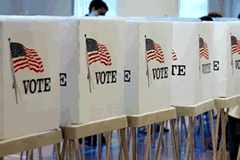Protecting Eligible Voters: Evenwel v. Abbott and the Future of Redistricting - Podcast
Civil Rights Practice Group Podcast
 In Evenwel v. Abbott, the Supreme Court held that the Constitution’s one-person, one-vote rule allows States to draw their legislative districts based on total population. In doing so, the Court rejected the appellants’ argument that the one-person, one-vote rule protects eligible voters and thus required States to equalize the population of eligible voters, not total population. The Court explicitly declined to resolve whether States may draw districts to equalize voter-eligible population rather than total population.
In Evenwel v. Abbott, the Supreme Court held that the Constitution’s one-person, one-vote rule allows States to draw their legislative districts based on total population. In doing so, the Court rejected the appellants’ argument that the one-person, one-vote rule protects eligible voters and thus required States to equalize the population of eligible voters, not total population. The Court explicitly declined to resolve whether States may draw districts to equalize voter-eligible population rather than total population.
Our experts analyzed the Supreme Court’s decision and reviewed the constitutional history underlying the one-person, one-vote doctrine. They discussed the impact of Evenwel on future redistricting decisions, including the Court’s willingness to accept legislative districts based on eligible voters.
Featuring:
- J. Michael Connolly, Counsel, Consovoy McCarthy Park PLLC
- Ilya Shapiro, Senior Fellow in Constitutional Studies, Cato Institute






